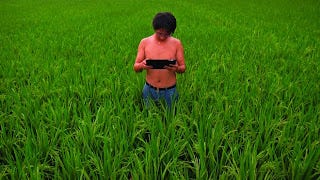High Tech High Life
Another 3-doc day and I'm pooped. Today I saw films on beauty pageants in India, fishermen in Kenya, and wrestlers in Seattle.
There were some AMAZING docs this year at Tribeca, and I'll be writing about some of them on the Storyhunter blog.
The real highlight for me was meeting a citizen journalist/blogger in China who goes by the name Zola. After watching the documentary by Stephen Maing, "High Tech Low Life" about Chinese citizen journalists, I feel like I have a new appreciation for what journalism is. In China, there's no such thing as freedom of the press, and before it was something that most Chinese people didn't even realize they're missing. But I get a sense that the genie's out of the bottle, and the Chinese internet police will never be able to put it back in.

Official Movie Art "High Tech Low Life"
Enter a young twenty-something former vegetable hawker from the Chinese countryside named Zola, (Real life name is Zhou Shuguang 周曙光) who has discovered a passion for journalism . He refers to himself as a blogger to sound less serious. He changes the DNS server to a foreign host in order to get around the "Great Firewall" of China. He becomes a voice of the poor who faced the destruction of houses in Beijing just before the Olympics. He investigates an alleged murder by a Chinese official that was labeled an "accident."
Zola says at one point in the film, “The truth is, I don’t know what journalism is. I just record what I see.” And that's what is so endearing about him; how natural he is about his work. It seemed like he was born to be a reporter, and that nothing in life could give him the satisfaction it gives him (I know the feeling). He disobeyed his family and traditions and the law to do a job that he didn't get paid for. But he sees himself as a patriot responding to the call of duty, putting civic responsibility ahead of his own personal safety.
It made me wonder about the nature of this thing we call journalism. What is this need to know the truth and to share that truth with others? If it doesn't exist, would we need to invent it? Perhaps it is as natural to humankind as love, war, and civilization itself, a necessary byproduct of community? Or is it simply a natural reaction to corruption and crime? If a society was perfect, then journalism would not need to exist, right? But of course that's impossible.
Zola did face repercussions for his actions. He wasn't allowed to leave the country at one point. And now he is based in Taiwan, where he can work much more freely. I told him after the movie that he is a hero for doing what he's doing. Knowing that people like him exist make me feel better about the state of journalism, and humanity.

Me and Zola after the film

